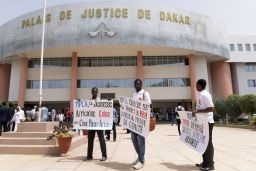Story highlights
Ex-Chad President Hissene Habre found guilty of rape, sexual slavery and ordering the deaths of 40,000
"This ruling is a landmark," U.S. Secretary of State John Kerry says
An African court on Monday sentenced former Chadian dictator Hissene Habre to life in prison for crimes against humanity in a landmark case that rights groups say could open the door for more war crimes convictions on the continent.
The court in Senegal found Habre guilty of crimes against humanity, rape, forced slavery and kidnapping as well as ordering the killings of 40,000 people during his rule between 1982 and 1990. Habre had denied the accusations and refused to recognize the legitimacy of the court.
The former President showed little emotion as he heard the verdict, with his face obscured partly by a turban and sunglasses.

Those who suffered under Habre’s rule and their families celebrated outside the courthouse in Dakar, Senegal, as women dressed in bright traditional prints danced.
The decision makes Habre the first African former head of state to be convicted on the continent, according to Human Rights Watch. It is also the first time that a court of one country has prosecuted the former ruler of another over human rights crimes, the group said.
“This verdict sends a powerful message that the days when tyrants could brutalize their people, pillage their treasury and escape abroad to a life of luxury are coming to an end,” tweeted Human Rights Watch lawyer Reed Brody, who was inside the courthouse.
Habre fled to Senegal in 1990 after his ouster. A Senegalese judge first indicted him in 2000, but the case stalled several times over the years. It wasn’t until 2012 that progress was made on the trial, when Macky Sall became Senegal’s President and the International Court of Justice ordered either a prosecution or extradition.
The court heard some extraordinary testimony, including one moment where a woman testified that Habre had raped her.

Survivors described the main forms of torture, in particular the “arbatachar,” which involved tying all four of a prisoner’s limbs behind the back to interrupt the bloodstream and induce paralysis, Human Rights Watch reported. Another witness brought wooden sticks to court to demonstrate how his head was squeezed as torture.
A special court called the Extraordinary African Chambers was set up in Dakar, with the backing of the African Union in February 2013 to prosecute the “person or persons” most responsible for war crimes committed in Chad between 1982 and 1990 when Habre was President.
U.S. Secretary of State John Kerry welcomed Monday’s verdict. “This ruling is a landmark in the global fight against impunity for atrocities, including war crimes and crimes against humanity,” Kerry said in a statement.
“As a country committed to the respect for human rights and the pursuit of justice, this is also an opportunity for the United States to reflect on, and learn from, our own connection with past events in Chad,” he said, apparently referring to U.S. support for Habre in the 1980s to help assuage the influence of Libya’s Moammar Gadhafi.
Zeid Ra’ad Al Hussein, the U.N. high commissioner for human rights, descibed the ruling as groundbreaking.
“After years of struggle and many setbacks on the way to justice, this verdict is as historic as it was hard-won. I sincerely hope that today, at last, Habre’s victims will experience some sense of relief. In a world scarred by a constant stream of atrocities, the ramifications of this verdict are global. ”
Amnesty International also praised the verdict as “a victory for those victims who fought tirelessly to ensure Hissene Habre could not get away with crimes under international law.”
“This landmark decision should also provide impetus to the African Union or individual African states to replicate such efforts to deliver justice to victims in other countries in the continent,” said Gaetan Mootoo, an Amnesty International West Africa researcher.
The trial against Habre opened in Senegal in July, and 69 victims, 23 witnesses and 10 expert witnesses testified during the proceedings, Amnesty said, adding that the case “sets a new benchmark for efforts to end impunity in Africa.”
Habre’s attorneys refused to appear at the opening of the trial because they considered the court to be illegitimate. The court appointed three Senegalese lawyers to defend him, and after a brief adjournment, Habre was brought back in to court by force to be tried.
CNN’s Salma Abdelaziz and journalist Dominique Heckels contributed to this report.
